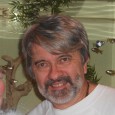Thought, being sequential and fragmentary, depends upon — and is — time. A fragmentary, sequential process, as part of time, will never fully understand the whole of time. Yet, the scientists continue to operate through sequential and fragmentary equations and analysis. Space and time are an integral part of one another; they are not two entirely different things. The space between the perceiver and that which is perceived involves limitation and fragmentation and necessitates time. Scientists do not generally transcend that limitation; they keep projecting fragmentary equations, theories, and use analysis based on what they have learned before. Many scientists claim that they are close to having a theory of everything, yet scientists do not understand what dark energy is (consisting of 68% of the known universe); they also do not know what dark matter is (consisting of 27% of the known universe); they do not understand a lot regarding the basic essence of the cosmos. There is evidence, for example, that the so-called constant speed of light may be changing. New tests are exploring this. The whole of physics is predicated on the constancy of the speed of light. (Scientists may, however, understand some rather remarkable things at this point. Leonard Susskind’s Holographic Principle of the Universe comes to mind; however, even principles such as this are, of course, limited and fragmentary. I used to hang out with Loren Billings, who ran the Museum of Holography in Chicago and, decades ago, way before these expert scientists came up with this holographic theory stuff, we used to have wonderful discussions about the likely holographic nature of the universe… about how a large amount of the entire universe functions much like a hologram.)
The structure of the perceiver (psychologically) being separate from the perceived… is what is formulated by limited thought. This thought also sees the past as separate from the future. Fragmentation will understand things only in very limited ways. That very limitation, however, can (and often does) contribute to conflict, indifference, hatred, competition, and suffering. To step out of all that may not require time, struggle, theories, religions, authorities, practices, or any other piecemeal processes. There is a fundamental psychological revolution that is beyond the framework of fragmentation and conflict. Currently, science is replacing religion as a major contributor of the worldview. If science tends to stress fragmentation, which it (for the most part, but not entirely) has been doing, then people will, unfortunately, likely remain stuck in fragmentary frameworks.


Terrific exposition of the nature of understanding, and lovely photo!
Thank you much, LV! Glad you see something of depth! 🙂
It may not be the eye of the tiger, but it’s a very fine eye, indeed. Out of curiosity, what kind of lens are you using that allows such detail, and how far away from His Toadness were you? I usually can’t get close enough for anything more than a “kerplunk!”
Well, i’d much rather get questions about philosophy, which this blog is mostly about. M.Zuiko 60mm Macro. 7 inches! 🙂
But sometimes technology can help us see more, and seeing more can help us understand and appreciate more!
Very intelligent and well-written article. You so succinctly describe my own instinctive feelings on the nature of the world and perception.
Good to read, Nikita! 🙂
What a marvellous photo of Mr Toad. 😀
Thank you, Scifi! He was in our backyard by the river. 🙂
How lovely 🙂
Interesting thoughts on our limited abilities to understand the universe. And nice toad, too!
Thank you much, Eilene! 🙂
Seems like man’s limitation prevents him from understanding a lot of very important things.
We’ll just have to keep bumbling along, despite it!😉
My thoughts are definitely fragmentary … not always what I would term “sequential”, though. They get tangled!
About the scientists and all who look to them for answers: there will always be far more UNknown than known … and to me, it seems likely it is all ever-evolving … perhaps even such as the speed of light.
Wonderful image – complexity of an eye one seldom looks into.
Tangled! Please don’t get all tied up in knots!
If it’s evolving (including the speed of light), it’s within a limited domain within a much larger situation.
Thanks, Jazz! 🙂
“Everything you know could be wrong.”
-Don Shimoda, from The Messiah’s Handbook.
Keep thinking,
Paz
Yes but endlessly thinking is not the answer; merely thinking is mostly what humanity has been doing for millennia, and look where it has gotten this dying planet.
Wonderful capture, beautiful frog’s eyes!
Great post! Keep it up!